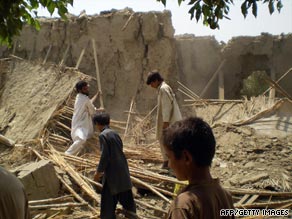
The leader of the Pakistani Taliban, Baitullah Mehsud, was likely killed in a U.S. Predator drone attack in a remote tribal region Wednesday, said a Pakistani official who has knowledge of intelligence matters.
The strike in Pakistan’s South Waziristan tribal area was based on “solid intel,” the official told CNN. And following the attack, “the Mehsud network has gone quiet as if in shock,” the official said. The official cautioned that, “there is a high degree of confidence but certainty only comes after physical evidence and DNA is processed.” After all, Mehsud “has shown up alive after previous near misses,” the official pointed out. One such near miss was at a funeral Mehsud was attending in Pakistan’s tribal areas in late June. The funeral was targeted in a drone attack but the Pakistani Taliban leader is reported to have missed being killed by a few hours. According to both U.S. and Pakistani officials, Mehsud masterminded former Pakistani Prime Minister Benazir Bhutto’s assassination in December 2007. At an unusual news conference he convened in May 2008, Mehsud boasted that he had hundreds of trained suicide bombers ready for martyrdom. He said he would use them to wage a holy war against American and NATO forces in Afghanistan.
Don’t Miss
Adviser: Obama wants al Qaeda destroyed
Pakistani leader’s wife dies in suspected drone attack
Whether or not Mehsud was killed on Wednesday, the drone strike targeting him is part of two larger patterns. The first is that the Obama administration has ramped up the drone program aimed at militants based inside Pakistan beyond the policy it inherited from the Bush administration. A count of drone attacks in Pakistan — based on reliable media counts and discussions with Pakistani and American officials — shows 34 such attacks in 2008 that killed at least 10 al Qaeda or Taliban leaders. In 2009, the Obama administration has already authorized 28 strikes. The pace of the drone program has been dramatically scaled up. But the Obama administration’s ratcheted-up drone strikes have succeeded in killing mostly lower-level militants and civilians and few “high value targets” such as Abu Sulayman al Jazairi on April 29 and possibly Saad bin Laden, one of the Osama bin Laden’s sons who had served as a lower level commander within al Qaeda. Bin Laden’s death, however, has not been confirmed. The second pattern is that the Obama administration has increasingly been working with the Pakistani government to attack the Pakistani Taliban. Of the 30 strikes this year, 19 have targeted Mehsud’s home base of South Waziristan. Whether or not Mehsud is dead, the strikes have applied pressure on his militant network in Pakistan. Two U.S. officials familiar with the drone program point out that the number of “spies” the Pakistani Taliban have killed has risen dramatically in the past year. That suggests that the militants are turning on themselves to root out possible sources of the often-pinpoint intelligence decimating their ranks.